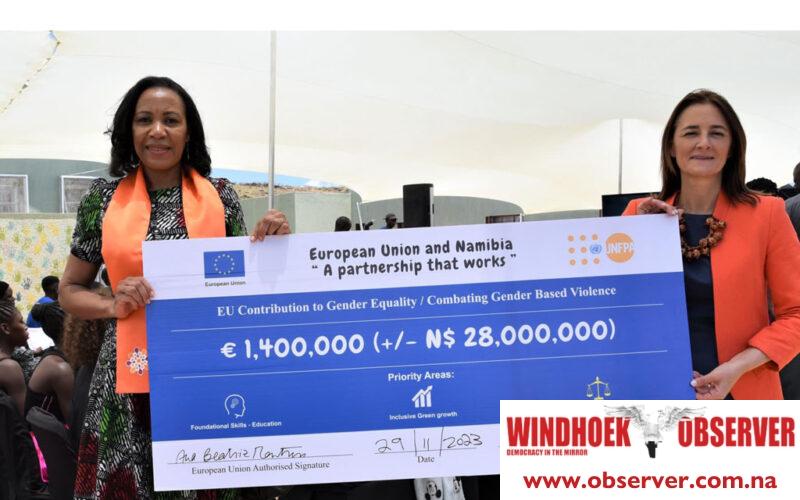Martin Endjala
In a determined effort to combat Gender-Based Violence (GBV) in the country, the European Union (EU) has announced a contribution of N$28 million to fight the scourge in targeted regions.
Speaking at the launch of the Combating GBV campaign and the signing of the contribution agreement in Windhoek yesterday, titled “Gender Equality/Combating Gender-Based Violence,” EU Ambassador to Namibia Beatriz Martins stated that the contribution agreement is a collaborative effort between the EU and the United Nations Population Fund (UNFPA).
She stressed that the aim is to promote gender equality and combat GBV in Namibia, underlining the significance of a collective commitment to eradicating GBV, which cannot be overstated.
“We want to empower more women and girls, in all their diversity, to be economic, political, or environmental actors and leaders. We want to continue integrating women, peace, and security into the broader gender equality and women’s empowerment agenda,” Martins stated.
She explained that the contribution agreement with UNFPA has been meticulously designed with clear objectives and a comprehensive approach to address the pervasive challenges faced by women and girls in Namibia.
These actions, the Ambassador added, have been developed jointly with the UNFPA Namibia country office and the Ministry of Gender Equality, Poverty Eradication, and Social Welfare, drawing insights from national health and gender-based violence information systems, as well as recent studies highlighting the scope, scale, and gaps in addressing gender-based violence.
Despite commendable achievements in the realm of human rights and gender equality, Namibia still faces persistent challenges related to gender-based violence, according to Martins. GBV rates remain unacceptably high, especially in certain regions where rates soar between 28 percent and 42 percent.
This project aims to reach these vulnerable women in a concerted manner, as well as the broader society, including parents/guardians, law and policymakers, service providers from health, social, education, judiciary, and law enforcement sectors of both government and civil society, community leaders, indigenous groups, and many more.
Martins pointed out that gender equality is not just a moral imperative but a prerequisite for sustainable development.
Namibia has shown commitment to closing its gender gap and addressing violence, as evidenced by Namibian laws, including the Married Persons Equality Act, Combating of Domestic Violence Act, Children’s Status Act, Combating of Rape Act, and Maintenance Act, along with the development of a National Gender Policy and the National Prioritized Plan of Action on GBV.
She said that there is still much more to do to address gender inequality in areas such as political representation, access to education, and employment opportunities.
Martins believes that the challenges Namibia faces are multifaceted, rooted in socially constructed gender roles, economic disparities, and harmful cultural norms.
She indicated that this initiative recognizes the need for a comprehensive, multi-level approach, involving national and subnational institutions, civil society, and communities. Its goal is not only to prevent gender-based violence but also to protect the rights of women and girls to live free from violence.
Subsequently, the contribution agreement was signed, along with the launch of its communication campaign, “Say Yes to Ending GBV,” which is taking place within the framework of the 16 Days of Activism against GBV.
The 16 Days of Activism began on November 25, 2023, the International Day to End Violence against Women, and will continue until Human Rights Day and the 75th anniversary of the Universal Declaration of Human Rights on 10 December 2023.




